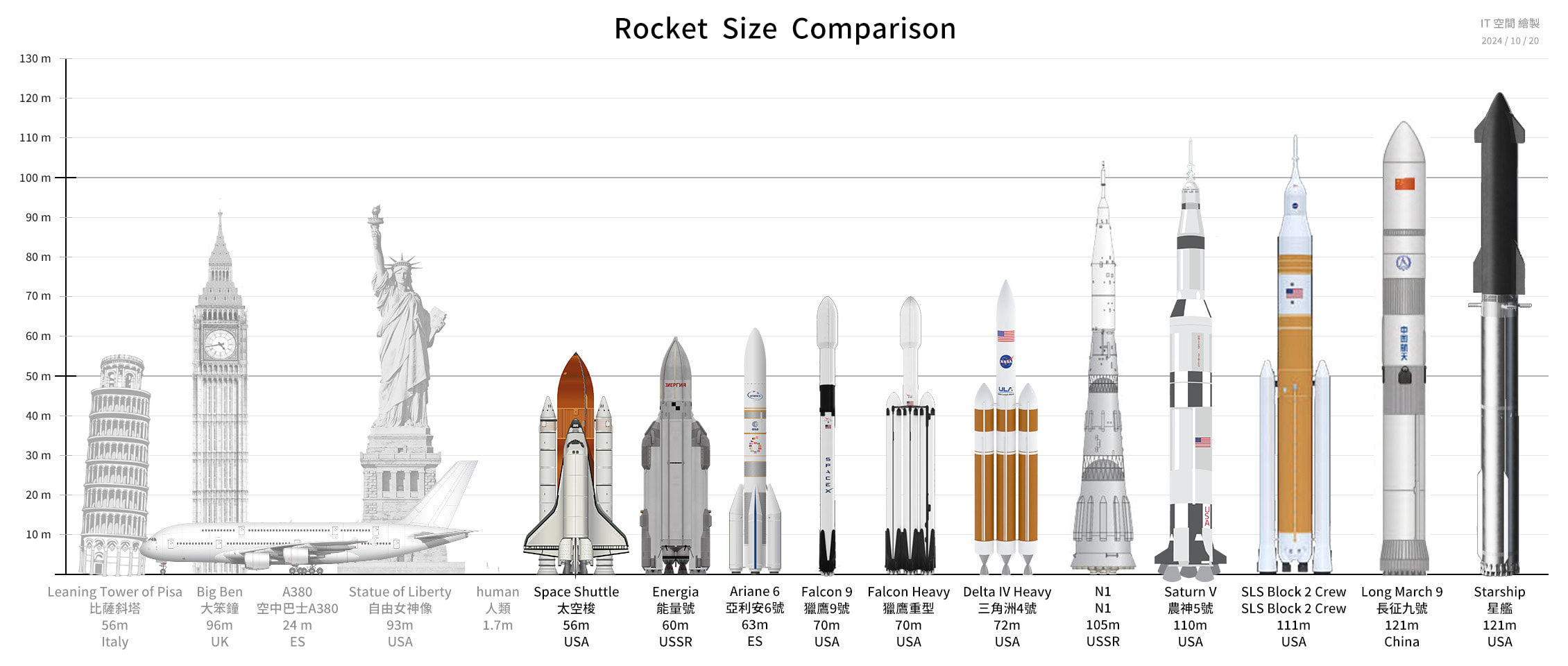(This article was translated by AI and then reviewed by a human.)
Preface
On October 13th, just last week, SpaceX's Starship rocket conducted its fifth test flight and successfully reached its target goals. The second-stage spacecraft made a soft landing in the designated area over the Indian Ocean, while the first-stage Super Heavy booster returned to the launch site and was caught mid-air by robotic arms.
The most impressive part was the precise return of the 71-meter-tall first-stage booster to the launch site, where it was caught and recovered by the “chopsticks” arm—a truly sci-fi moment.
You can watch the official video here: https://x.com/SpaceX/status/1845442658397049011
Mechazilla has caught the Super Heavy booster! pic.twitter.com/6R5YatSVJX
— SpaceX (@SpaceX) October 13, 2024
The Starship rocket reaches a height of 121 meters, making it the tallest rocket in history so far 🚀.
However, it might be hard to imagine just how tall that is. So, I looked up some of the other tallest rockets in history to compare. This way, you can get a clear idea right away!
Rocket height comparison chart
The images I collected include the following rockets:
- USA Starship:121 meters
- China Long March 9:114 meters
- USA SLS Block 2 Crew:111 meters
- USA Saturn V:110 meters
- USSR N1:105 meters
- USA Delta IV Heavy:72 meters
- USA Falcon Heavy:70 meters
- USA Falcon 9:70 meters
- ES Ariane 6:63 meters
- USSR Energia:60 meters
- USA Space Shuttle:56 meters
I also added some famous landmarks for comparison:
- Statue of Liberty:93 meters
- Big Ben:96 meters
- Leaning Tower of Pisa:56 meters
- Airbus A380:24 meters
I searched for buildings in Taiwan and found that 120 meters is around the 30th to 33rd floor.

* If there are multiple rockets in the same series, I only picked the tallest one to avoid too many images, like the U.S. SLS series, China Long March series, and Europe Ariane series.
* I didn't include rockets still in development with uncertain height (such as Russia's Yenisei rocket) or those that were canceled (like the U.S. Ares series).
* The images are scaled according to their height, but it's not very precise. And since they're from different sources, their styles are a bit different. XD
I'm not an expert in aerospace, so if anyone finds any mistakes or has suggestions, please feel free to leave a comment and let me know.
Image sources of the rockets
- Starship:https://www.spacex.com/vehicles/starship/
- Long March 9:https://sat.huijiwiki.com/wiki/长征九号
- SLS Block 2 Crew:https://www.nasa.gov/humans-in-space/space-launch-system/
- Saturn V:https://airandspace.si.edu/multimedia-gallery/saturn-v-textjpg
- N1:https://historicspacecraft.com/Rockets_Russian.html#N1
- Delta IV Heavy:https://www.turbosquid.com/pt_br/3d-models/3d-delta-iv-heavy-model-1559988
- Falcon Heavy:https://www.spacex.com/vehicles/falcon-heavy/
- Falcon 9:https://www.spacex.com/vehicles/falcon-9/
- Ariane 6:https://zh.wikipedia.org/zh-tw/亞利安6號運載火箭
- Energia:https://en.wikipedia.org/wiki/Energia_(rocket)
- Space Shuttle:https://www.britannica.com/science/space-exploration
Conclusion
Seeing these massive structures launch into space and be recovered is incredible. Both the craftsmanship and the precision needed to control them really make you admire the engineers behind these rockets.
I don’t spend my time pontificating about high-concept things; I spend my time solving engineering and manufacturing problems.
—— Elon Musk (famous entrepreneur)
🔻 如果覺得喜歡,歡迎在下方獎勵我 5 個讚~